Fleurs du Mal Magazine


Or see the index
Over a career that spans four decades and thirteen studio albums with Pet Shop Boys, Neil Tennant has consistently proved himself to be one of the most elegant and stylish of contemporary lyricists.
 Arranged alphabetically, One Hundred Lyrics and a Poem presents an overview of his considerable achievement as a chronicler of modern life: the romance, the break-ups, the aspirations, the changing attitudes, the history, the politics, the pain.
Arranged alphabetically, One Hundred Lyrics and a Poem presents an overview of his considerable achievement as a chronicler of modern life: the romance, the break-ups, the aspirations, the changing attitudes, the history, the politics, the pain.
The landscape of Tennant’s lyrics is recognisably British in character – restrained and preoccupied with the mundane, occasionally satirical, yet also yearning for escape and theatrical release.
Often surprisingly revealing, this volume is contextualised by a personal commentary on each lyric and an introduction by the author which gives a fascinating insight into the process and genesis of writing.
Flamboyant, understated, celebratory and elegiac, Neil Tennant’s lyrics are a document of our times.
Everything I’ve ever done
Everything I ever do
Every place I’ve ever been
Everywhere I’m going to
One Hundred Lyrics and a Poem
Neil Tennant
Hardback
272 pages
English
Poetry
Published 01/11/2018
ISBN13 9780571348909
Publisher Faber & Faber Inc.
18,99 euro
# new books
One Hundred Lyrics and a Poem
Neil Tennant
• fleursdumal.nl magazine
More in: Archive S-T, Archive S-T, Art & Literature News, AUDIO, CINEMA, RADIO & TV, Pet Shop Boys
 Who has not suffered grief?
Who has not suffered grief?
In Mourning Songs, the brilliant poet and editor Grace Schulman has gathered together the most moving poems about sorrow by the likes of Elizabeth Bishop, William Carlos Williams, Gwendolyn Brooks, Neruda, Catullus, Dylan Thomas, W. H. Auden, Shakespeare, Emily Dickinson, W. S. Merwin, Lorca, Denise Levertov, Keats, Hart Crane, Michael Palmer, Robert Frost, Hopkins, Hardy, Bei Dao, and Czeslaw Milosz—to name only some of the masters in this slim volume.
“The poems in this collection,” as Schulman notes in her introduction, “sing of grief as they praise life.” She notes: “As any bereaved survivor knows, there is no consolation. ‘Time doesn’t heal grief; it emphasizes it,’ wrote Marianne Moore.
The loss of a loved one never leaves us. We don’t want it to. In grief, one remembers the beloved. But running beside it, parallel to it, is the joy of existence, the love that causes pain of loss, the loss that enlarges us with the wonder of existence.”
Winner of the Poetry Society of America’s highest award, The Frost Medal, Grace Schulman is the author of seven poetry volumes as well as a book of essays and a new memoir, Strange Paradise: Portrait of a Marriage, about her life with her beloved late husband Jerome. She is a Distinguished Professor of English at Baruch College, CUNY, the former director of the Poetry Center, 92nd Street Y, and was for thirty-five years the poetry editor of The Nation.
Mourning Songs
Poems of sorrow and Beauty
Edited by Grace Schulman
Paperback
96 pages
Publisher: New Directions
Language: English
ISBN-10: 0811228665
ISBN-13: 978-0811228664
Product Dimensions: 4 x 6 inches
Price US 11.95
1 edition: May 28, 2019
# new books
Mourning Songs
Poetry
• fleursdumal.nl magazine
More in: - Book News, Archive S-T, Archive S-T, Art & Literature News, Danse Macabre
A poet and anthropologist explores the surprising world of war games in mock Middle Eastern villages in which the U.S. military trains.
 With deft lyrical attention, these documentary poems reveal the nuanced culture and violence of the war machine—alive and well within these basecamp villages, the American military, and, ultimately, the human heart.
With deft lyrical attention, these documentary poems reveal the nuanced culture and violence of the war machine—alive and well within these basecamp villages, the American military, and, ultimately, the human heart.
Kill Class is based on Nomi Stone’s two years of fieldwork in mock Middle Eastern villages at military bases across the United States.
The speaker in these poems, an anthropologist, both witnesses and participates in combat training exercises staged at “Pineland,” a simulated country in the woods of the American South, where actors of Middle Eastern origin are hired to theatricalize war, repetitively pretending to bargain and mourn and die.
Kill Class is an arresting ethnography of American military culture, one that allows readers to circle at length through the cloverleaf interchanges where warfare nestles into even the most mundane corners of everyday life.
Nomi Stone is a poet, anthropologist, and author of a previous book of poems, Stranger’s Notebook (TriQuarterly, 2008). Winner of a 2018 Pushcart Prize, Stone’s poems appear recently in POETRY Magazine, American Poetry Review, The Best American Poetry, The New Republic, Tin House, New England Review, and elsewhere. Stone has a PhD in Cultural Anthropology from Columbia University, an MPhil in Middle East Studies from Oxford, and an MFA in Poetry from Warren Wilson College. She teaches at Princeton University and her ethnography in progress, Human Technology and American War, is a finalist for the University of California Press Atelier Series.
Kill Class
by Nomi Stone (Author)
Paperback
87 pages
Publisher: Tupelo Press
February 1, 2019
Language: English
Poetry
ISBN-10: 1946482196
ISBN-13: 978-1946482198
$17.95
# new poetry
Kill Class
by Nomi Stone
• fleursdumal.nl magazine
More in: *War Poetry Archive, - Book News, - Book Stories, Archive S-T, Archive S-T, Art & Literature News, WAR & PEACE
Geliefden Hanna en Loek besluiten samen een scenario te schrijven. Een liefdesverhaal moet het worden, de personages moeten elkaar krijgen. Maar niet op een clichématige manier.
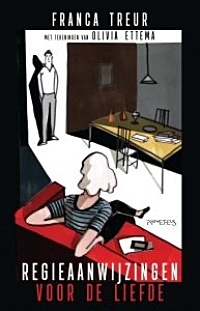 Intussen wordt het steeds benauwder in de huiskamer. Al snel gaan de ramen open en komt de buitenwereld binnen. Aan de ene kant brengt dat lucht, aan de andere kant verleiding.
Intussen wordt het steeds benauwder in de huiskamer. Al snel gaan de ramen open en komt de buitenwereld binnen. Aan de ene kant brengt dat lucht, aan de andere kant verleiding.
Bestaat de veilige cocon nog of heeft de globalisering automatisch ieders wereld groter gemaakt? Welke concessies doet een filmmaker? Hoe flexibel zijn principes? Kun je de redder in nood zijn van je ex?
In vijftig korte hoofdstukken en vijftig tekeningen wordt het moderne leven gefileerd, met bijzondere aandacht voor de liefdesrelatie. Is het moment dat de personages elkaar krijgen het moment waarop Loek en Hanna elkaar verliezen?
Franca Treur debuteerde in 2009 met de roman Dorsvloer vol confetti, waarvan meer dan 150.000 exemplaren werden verkocht. Het was het meest bejubelde literaire debuut in jaren. Het boek won verschillende prijzen en het werd verfilmd. In 2014 verscheen haar tweede roman, De woongroep, en in 2015 het Zeeuwse Boekenweekgeschenk Ik zou maar nergens op rekenen. Daarnaast schrijft ze verhalen, essays en columns voor uiteenlopende media.
Franca Treur
Regieaanwijzingen voor de liefde
Gebonden
216 p.
Druk 1
Verschenen 08-02-19
Uitgever Prometheus
Nederlandse fictie
ISBN 9789044640441
€ 19,99
# new fiction
franca treur
regieaanwijzingen voor de liefde
• fleursdumal.nl magazine
More in: - Book News, - Bookstores, Archive S-T, Art & Literature News, Franca Treur
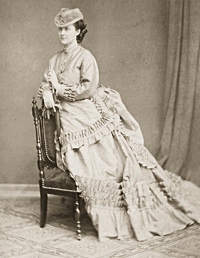
Von Liebe
Am Abend sprach das Meer und flüsterte:
Ihr schönen Mägdelein, erzählt mir leise,
Ich will die Liebe wissen! Redet mir
So von der Liebe, gleich als sollte ich
Dran sterben, so als müsst’ in Ruhe ich
Versinken dran, als könnte sie vorm Sturme
Mich schützen, dass so wütend er nicht mehr
Auf mich sich stürzte! – O! so sprachen da
Die Mägdelein, – Wir wissen wahrlich nicht,
Du armes Meer, ob wir erzählen dürfen;
Denn nimmermehr würdst du in wilder Kraft
Die Schiffe schleudern wollen, und der Felsen
Sorgenumwölbte Stirn mit Schaume peitschen,
Noch wälzen unter jähe, grüne Klippen
Der Sterne Blicken. Glaub’ uns Meer, Du wolltest
So mächtig nimmer sein, so scheu und spröde,
In deinen Schoß und in dein Herz nicht mehr
Die schlafumfangnen Menschenherzen saugen.
Du würdest dann gleich uns den Himmel ansehn,
Und ihn nicht sehen, lächeln, wie der Wind
Vorüberweht, und weinen, weil die Sonne
Aufgeht! Nein! wir werden nichts erzählen!
Carmen Sylva
(1843-1916)
Von Liebe
Gedicht
• fleursdumal.nl magazine
More in: Archive S-T, Archive S-T, CLASSIC POETRY
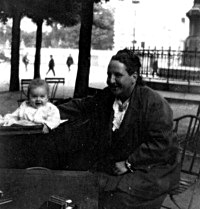
Mrs. Whitehead
But you like it.
They can’t any of them be quite as bad because they learned french but I never did.
He doesn’t look dead at all.
The wind might have blown him.
He comes from that direction. That’s the way.
They are not knotted. Have you smelt it. What would you suggest, your advice I have come across three or four.
So they are the others.
Separate them.
It does make one come, he is extraordinarily charming and endearing once of twice only twice I think.
He is not staying out that’s hard beside that what does he do.
That’s long for his mother.
She travelled from this rest. She crocheted from this nest.
She crocheted from this nest. I thought it wasn’t ever.
It’s one of my favorite ones this.
And yet not this.
Isn’t it funny.
It isn’t.
Break or breaking, very fair, break or very wanting.
I tried it this way before.
Very difficult to change extra places and yet I can agree. I can agree by that. I rest this piece of it and it’s nearly the same climate. I will tell you why they want a real door. They choose it.
They do so and very pure water. They are safe when they take a bath. Oh it is very. Oh it is.
In a way a vest.
I do think you get what you want.
Corrections.
It is eleven weeks from the middle of September. I glance in a way.
It is eleven weeks from the middle of September.
Total recollect others.
I glance at and I can recollect others. I make a division neatly, I close.
What is wrong with not blue. That is right with apples. Apples four. For. Fore.
Before that.
Next stretching.
Next for that leaf stretching.
I do not state leaf.
I like to beg very much stream.
Not exactly in state.
Understate.
All in so.
They expect all the blues to take of all the other families, the whites are extra they are beside all that, they make a little house and through and beside that they live in Paris.
Hardly enough for wood.
Not a color even.
By now a change of grass and wedding rings and all but the rest plan. I don’t care I won’t look.
I am not sure that yellow is good. I am tall.
Allow that. I don’t want any more out in conversation.
I can be careful.
Not within wearing it.
I cannot say to stay.
No please don’t get up.
And now that.
Yes I see.
Did you pay him for that whether for a spider and such splendor and indeed quitting. I meant to gather.
I see it I see it.
Please ocean spoke please Helen land please take it away.
I saw a spoken leave leaf and flowers made vegetables and foliage in soil. I saw representative mistakes and glass cups, I saw a whole appearance of respectable refugees, I did not ask actors I asked pearls, I did not choose to ask trains, I was satisfied with celebrated ransoms. I cannot deny Bertie Henschel is coming tomorrow. Saturdays are even. There is a regular principle, if you mention it you mention what happened.
What do you make of it.
You exceed all hope and all praise.
Stein, Gertrude
(1874-1946)
Mrs. Whitehead
fleursdumal.nl magazine
More in: Archive S-T, Archive S-T, Gertrude Stein, Stein, Gertrude
Counting Her Dresses
A Play
Part I.
ACT I.
When they did not see me.
I saw them again.
I did not like it.
ACT II.
I count her dresses again.
ACT III.
Can you draw a dress.
ACT IV.
In a minute.
Part II.
ACT I.
Believe in your mistake.
ACT II.
Act quickly.
ACT III.
Do not mind the tooth.
ACT IV.
Do not be careless.
Part III.
ACT I.
I am careful.
ACT II.
Yes you are.
ACT III.
And obedient.
ACT IV.
Yes you are.
ACT V.
And industrious.
ACT VI.
Certainly.
Part IV.
ACT I.
Come to sing and sit.
ACT II.
Repeat it.
ACT III.
I repeat it.
Part V.
ACT I.
Can you speak quickly.
ACT II.
Can you cough.
ACT III.
Remember me to him.
ACT IV.
Remember that I want a cloak.
Part VI.
ACT I.
I know what I want to say. How do you do I forgive you everything and there is nothing to forgive.
Part VII.
ACT I.
The dog. You mean pale.
ACT II.
No we want dark brown.
ACT III.
I am tired of blue.
Part VIII.
ACT I.
Shall I wear my blue.
ACT II.
Do.
Part IX.
ACT I.
Thank you for the cow.
Thank you for the cow.
ACT II.
Thank you very much.
Part X.
ACT I.
Collecting her dresses.
ACT II.
Shall you be annoyed.
ACT III.
Not at all.
Part XI.
ACT I.
Can you be thankful.
ACT II.
For what.
ACT III.
For me.
Part XII.
ACT I.
I do not like this table.
ACT II.
I can understand that.
ACT III.
A feather.
ACT IV.
It weighs more than a feather.
Part XIII.
ACT I.
It is not tiring to count dresses.
Part XIV.
ACT I.
What is your belief.
Part XV.
ACT I.
In exchange for a table.
ACT II.
In exchange for or on a table.
ACT III.
We were satisfied.
Part XVI.
ACT I.
Can you say you like negro sculpture.
Part XVII.
ACT I.
The meaning of windows is air.
ACT II.
And a door.
ACT III.
A door should be closed.
Part XVIII.
ACT I.
Can you manage it.
ACT II.
You mean dresses.
ACT III.
Do I mean dresses.
Part XIX.
ACT I.
I mean one two three.
Part XX.
ACT I.
Can you spell quickly.
ACT II.
I can spell very quickly.
ACT III.
So can my sister-in-law.
ACT IV.
Can she.
Part XXI.
ACT I.
Have you any way of sitting.
ACT II.
You mean comfortably.
ACT III.
Naturally.
ACT IV.
I understand you.
Part XXII.
ACT I.
Are you afraid.
ACT II.
I am not any more afraid of water than they are.
ACT III.
Do not be insolent.
Part XXIII.
ACT I.
We need clothes.
ACT II.
And wool.
ACT III.
And gloves.
ACT IV.
And waterproofs.
Part XXIV.
ACT I.
Can you laugh at me.
ACT II.
And then say.
ACT III.
Married.
ACT IV.
Yes.
Part XXV.
ACT I.
Do you remember how he looked at clothes.
ACT II.
Do you remember what he said about wishing.
ACT III.
Do you remember all about it.
Part XXVI.
ACT I.
Oh yes.
ACT II.
You are stimulated.
ACT III.
And amused.
ACT IV.
We are.
Part XXVII.
ACT I.
What can I say that I am fond of.
ACT II.
I can see plenty of instances.
ACT III.
Can you.
Part XXVIII.
ACT I.
For that we will make an arrangement.
ACT II.
You mean some drawings.
ACT III.
Do I talk of art.
ACT IV.
All numbers are beautiful to me.
Part XXIX.
ACT I.
Of course they are.
ACT II.
Thursday.
ACT III.
We hope for Thursday.
ACT IV.
So do we.
Part XXX.
ACT I.
Was she angry.
ACT II.
Whom do you mean was she angry.
ACT III.
Was she angry with you.
Part XXXI.
ACT I.
Reflect more.
ACT II.
I do want a garden.
ACT III.
Do you.
ACT IV.
And clothes.
ACT V.
I do not mention clothes.
ACT VI.
No you didn’t but I do.
ACT VII.
Yes I know that.
Part XXXII.
ACT I.
He is tiring.
ACT II.
He is not tiring.
ACT III.
No indeed.
ACT IV.
I can count them.
ACT V.
You do not misunderstand me.
ACT VI.
I misunderstand no one.
Part XXXIII.
ACT I.
Can you explain my wishes.
ACT II.
In the morning.
ACT III.
To me.
ACT IV.
Yes in there.
ACT V.
Then you do not explain.
ACT VI.
I do not press for an answer.
Part XXXIV.
ACT I.
Can you expect her today.
ACT II.
We saw a dress.
ACT III.
We saw a man.
ACT IV.
Sarcasm.
Part XXXV.
ACT I.
We can be proud of tomorrow.
ACT II.
And the vests.
ACT III.
And the doors.
ACT IV.
I always remember the roads.
Part XXXVI.
ACT I.
Can you speak English.
ACT II.
In London.
ACT III.
And here.
ACT IV.
With me.
Part XXXVII.
ACT I.
Count her dresses.
ACT II.
Collect her dresses.
ACT III.
Clean her dresses.
ACT IV.
Have the system.
Part XXXVIII.
ACT I.
She polished the table.
ACT II.
Count her dresses again.
ACT III.
When can you come.
ACT IV.
When can you come.
Part XXXIX.
ACT I.
Breathe for me.
ACT II.
I can say that.
ACT III.
It isn’t funny.
ACT IV.
In the meantime.
Part XL.
ACT I.
Can you say.
ACT II.
What.
ACT III.
We have been told.
ACT IV.
Oh read that.
Part XLI.
ACT I.
I do not understand this home-coming.
ACT II.
In the evening.
ACT III.
Naturally.
ACT IV.
We have decided.
ACT V.
Indeed.
ACT VI.
If you wish.
Gertrude Stein
(1874-1946)
Counting Her Dresses.
A Play
fleursdumal.nl magazine
More in: Archive S-T, Archive S-T, Gertrude Stein, Stein, Gertrude, THEATRE
The She-Wolf
Leonard Bilsiter was one of those people who have failed to find this world attractive or interesting, and who have sought compensation in an “unseen world” of their own experience or imagination — or invention.
Children do that sort of thing successfully, but children are content to convince themselves, and do not vulgarise their beliefs by trying to convince other people. Leonard Bilsiter’s beliefs were for “the few,” that is to say, anyone who would listen to him.
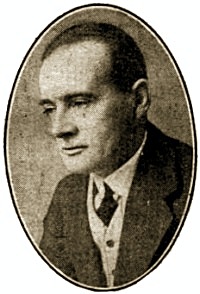 His dabblings in the unseen might not have carried him beyond the customary platitudes of the drawing-room visionary if accident had not reinforced his stock-intrade of mystical lore. In company with a friend, who was interested in a Ural mining concern, he had made a trip across Eastern Europe at a moment when the great Russian railway strike was developing from a threat to a reality; its outbreak caught him on the return journey, somewhere on the further side of Perm, and it was while waiting for a couple of days at a wayside station in a state of suspended locomotion that he made the acquaintance of a dealer in harness and metalware, who profitably whiled away the tedium of the long halt by initiating his English travelling companion in a fragmentary system of folk-lore that he had picked up from Trans–Baikal traders and natives.
His dabblings in the unseen might not have carried him beyond the customary platitudes of the drawing-room visionary if accident had not reinforced his stock-intrade of mystical lore. In company with a friend, who was interested in a Ural mining concern, he had made a trip across Eastern Europe at a moment when the great Russian railway strike was developing from a threat to a reality; its outbreak caught him on the return journey, somewhere on the further side of Perm, and it was while waiting for a couple of days at a wayside station in a state of suspended locomotion that he made the acquaintance of a dealer in harness and metalware, who profitably whiled away the tedium of the long halt by initiating his English travelling companion in a fragmentary system of folk-lore that he had picked up from Trans–Baikal traders and natives.
Leonard returned to his home circle garrulous about his Russian strike experiences, but oppressively reticent about certain dark mysteries, which he alluded to under the resounding title of Siberian Magic. The reticence wore off in a week or two under the influence of an entire lack of general curiosity, and Leonard began to make more detailed allusions to the enormous powers which this new esoteric force, to use his own description of it, conferred on the initiated few who knew how to wield it. His aunt, Cecilia Hoops, who loved sensation perhaps rather better than she loved the truth, gave him as clamorous an advertisement as anyone could wish for by retailing an account of how he had turned a vegetable marrow into a wood pigeon before her very eyes. As a manifestation of the possession of supernatural powers, the story was discounted in some quarters by the respect accorded to Mrs. Hoops’ powers of imagination.
However divided opinion might be on the question of Leonard’s status as a wonderworker or a charlatan, he certainly arrived at Mary Hampton’s house-party with a reputation for preeminence in one or other of those professions, and he was not disposed to shun such publicity as might fall to his share. Esoteric forces and unusual powers figured largely in whatever conversation he or his aunt had a share in, and his own performances, past and potential, were the subject of mysterious hints and dark avowals.
“I wish you would turn me into a wolf, Mr. Bilsiter,” said his hostess at luncheon the day after his arrival.
“My dear Mary,” said Colonel Hampton, “I never knew you had a craving in that direction.”
“A she-wolf, of course,” continued Mrs. Hampton; “it would be too confusing to change one’s sex as well as one’s species at a moment’s notice.”
“I don’t think one should jest on these subjects,” said Leonard.
“I’m not jesting, I’m quite serious, I assure you. Only don’t do it today; we have only eight available bridge players, and it would break up one of our tables. To-morrow we shall be a larger party. To-morrow night, after dinner —”
“In our present imperfect understanding of these hidden forces I think one should approach them with humbleness rather than mockery,” observed Leonard, with such severity that the subject was forthwith dropped.
Clovis Sangrail had sat unusually silent during the discussion on the possibilities of Siberian Magic; after lunch he side-tracked Lord Pabham into the comparative seclusion of the billiard-room and delivered himself of a searching question.
“Have you such a thing as a she-wolf in your collection of wild animals? A she-wolf of moderately good temper?”
Lord Pabham considered. “There is Loiusa,” he said, “a rather fine specimen of the timber-wolf. I got her two years ago in exchange for some Arctic foxes. Most of my animals get to be fairly tame before they’ve been with me very long; I think I can say Louisa has an angelic temper, as she-wolves go. Why do you ask?”
“I was wondering whether you would lend her to me for tomorrow night,” said Clovis, with the careless solicitude of one who borrows a collar stud or a tennis racquet.
“To-morrow night?”
“Yes, wolves are nocturnal animals, so the late hours won’t hurt her,” said Clovis, with the air of one who has taken everything into consideration; “one of your men could bring her over from Pabham Park after dusk, and with a little help he ought to be able to smuggle her into the conservatory at the same moment that Mary Hampton makes an unobtrusive exit.”
Lord Pabham stared at Clovis for a moment in pardonable bewilderment; then his face broke into a wrinkled network of laughter.
“Oh, that’s your game, is it? You are going to do a little Siberian Magic on your own account. And is Mrs. Hampton willing to be a fellow-conspirator?”
“Mary is pledged to see me through with it, if you will guarantee Louisa’s temper.”
“I’ll answer for Louisa,” said Lord Pabham.
By the following day the house-party had swollen to larger proportions, and Bilsiter’s instinct for self-advertisement expanded duly under the stimulant of an increased audience. At dinner that evening he held forth at length on the subject of unseen forces and untested powers, and his flow of impressive eloquence continued unabated while coffee was being served in the drawing-room preparatory to a general migration to the card-room.
His aunt ensured a respectful hearing for his utterances, but her sensation-loving soul hankered after something more dramatic than mere vocal demonstration.
“Won’t you do something to convince them of your powers, Leonard?” she pleaded; “change something into another shape. He can, you know, if he only chooses to,” she informed the company.
“Oh, do,” said Mavis Pellington earnestly, and her request was echoed by nearly everyone present. Even those who were not open to conviction were perfectly willing to be entertained by an exhibition of amateur conjuring.
Leonard felt that something tangible was expected of him.
“Has anyone present,” he asked, “got a three-penny bit or some small object of no particular value —?”
“You’re surely not going to make coins disappear, or something primitive of that sort?” said Clovis contemptuously.
“I think it very unkind of you not to carry out my suggestion of turning me into a wolf,” said Mary Hampton, as she crossed over to the conservatory to give her macaws their usual tribute from the dessert dishes.
“I have already warned you of the danger of treating these powers in a mocking spirit,” said Leonard solemnly.
“I don’t believe you can do it,” laughed Mary provocatively from the conservatory; “I dare you to do it if you can. I defy you to turn me into a wolf.”
As she said this she was lost to view behind a clump of azaleas.
“Mrs. Hampton —” began Leonard with increased solemnity, but he got no further. A breath of chill air seemed to rush across the room, and at the same time the macaws broke forth into ear-splitting screams.
“What on earth is the matter with those confounded birds, Mary?” exclaimed Colonel Hampton; at the same moment an even more piercing scream from Mavis Pellington stampeded the entire company from their seats. In various attitudes of helpless horror or instinctive defence they confronted the evil-looking grey beast that was peering at them from amid a setting of fern and azalea.
Mrs. Hoops was the first to recover from the general chaos of fright and bewilderment.
“Leonard!” she screamed shrilly to her nephew, “turn it back into Mrs. Hampton at once! It may fly at us at any moment. Turn it back!”
“I— I don’t know how to,” faltered Leonard, who looked more scared and horrified than anyone.
“What!” shouted Colonel Hampton, “you’ve taken the abominable liberty of turning my wife into a wolf, and now you stand there calmly and say you can’t turn her back again!”
To do strict justice to Leonard, calmness was not a distinguishing feature of his attitude at the moment.
“I assure you I didn’t turn Mrs. Hampton into a wolf; nothing was farther from my intentions,” he protested.
“Then where is she, and how came that animal into the conservatory?” demanded the Colonel.
“Of course we must accept your assurance that you didn’t turn Mrs. Hampton into a wolf,” said Clovis politely, “but you will agree that appearances are against you.”
“Are we to have all these recriminations with that beast standing there ready to tear us to pieces?” wailed Mavis indignantly.
“Lord Pabham, you know a good deal about wild beasts —” suggested Colonel Hampton.
“The wild beasts that I have been accustomed to,” said Lord Pabham, “have come with proper credentials from well-known dealers, or have been bred in my own menagerie. I’ve never before been confronted with an animal that walks unconcernedly out of an azalea bush, leaving a charming and popular hostess unaccounted for. As far as one can judge from outward characteristics,” he continued, “it has the appearance of a well-grown female of the North American timber-wolf, a variety of the common species canis lupus.”
“Oh, never mind its Latin name,” screamed Mavis, as the beast came a step or two further into the room; “can’t you entice it away with food, and shut it up where it can’t do any harm?”
“If it is really Mrs. Hampton, who has just had a very good dinner, I don’t suppose food will appeal to it very strongly,” said Clovis.
“Leonard,” beseeched Mrs. Hoops tearfully, “even if this is none of your doing can’t you use your great powers to turn this dreadful beast into something harmless before it bites us all — a rabbit or something?”
“I don’t suppose Colonel Hampton would care to have his wife turned into a succession of fancy animals as though we were playing a round game with her,” interposed Clovis.
“I absolutely forbid it,” thundered the Colonel.
“Most wolves that I’ve had anything to do with have been inordinately fond of sugar,” said Lord Pabham; “if you like I’ll try the effect on this one.”
He took a piece of sugar from the saucer of his coffee cup and flung it to the expectant Louisa, who snapped it in mid-air. There was a sigh of relief from the company; a wolf that ate sugar when it might at the least have been employed in tearing macaws to pieces had already shed some of its terrors. The sigh deepened to a gasp of thanks-giving when Lord Pabham decoyed the animal out of the room by a pretended largesse of further sugar. There was an instant rush to the vacated conservatory. There was no trace of Mrs. Hampton except the plate containing the macaws’ supper.
“The door is locked on the inside!” exclaimed Clovis, who had deftly turned the key as he affected to test it.
Everyone turned towards Bilsiter.
“If you haven’t turned my wife into a wolf,” said Colonel Hampton, “will you kindly explain where she has disappeared to, since she obviously could not have gone through a locked door? I will not press you for an explanation of how a North American timber-wolf suddenly appeared in the conservatory, but I think I have some right to inquire what has become of Mrs. Hampton.”
Bilsiter’s reiterated disclaimer was met with a general murmur of impatient disbelief.
“I refuse to stay another hour under this roof,” declared Mavis Pellington.
“If our hostess has really vanished out of human form,” said Mrs. Hoops, “none of the ladies of the party can very well remain. I absolutely decline to be chaperoned by a wolf!”
“It’s a she-wolf,” said Clovis soothingly.
The correct etiquette to be observed under the unusual circumstances received no further elucidation. The sudden entry of Mary Hampton deprived the discussion of its immediate interest.
“Some one has mesmerised me,” she exclaimed crossly; “I found myself in the game larder, of all places, being fed with sugar by Lord Pabham. I hate being mesmerised, and the doctor has forbidden me to touch sugar.”
The situation was explained to her, as far as it permitted of anything that could be called explanation.
“Then you really did turn me into a wolf, Mr. Bilsiter?” she exclaimed excitedly.
But Leonard had burned the boat in which he might now have embarked on a sea of glory. He could only shake his head feebly.
“It was I who took that liberty,” said Clovis; “you see, I happen to have lived for a couple of years in North–Eastern Russia, and I have more than a tourist’s acquaintance with the magic craft of that region. One does not care to speak about these strange powers, but once in a way, when one hears a lot of nonsense being talked about them, one is tempted to show what Siberian magic can accomplish in the hands of someone who really understands it. I yielded to that temptation. May I have some brandy? the effort has left me rather faint.”
If Leonard Bilsiter could at that moment have transformed Clovis into a cockroach and then have stepped on him he would gladly have performed both operations.
The She-Wolf
From ‘Beasts and Super-Beasts’
by Saki (H. H. Munro)
(1870 – 1916)
fleursdumal.nl magazine
More in: Archive S-T, Saki, Saki, The Art of Reading
Dans un village proche de la ville côtière de Putian, en Chine méridionale, au début du vingtième siècle, Yong Sheng est le fils d’un menuisier-charpentier qui fabrique des sifflets pour colombes réputés.
 Les habitants raffolent de ces sifflets qui, accrochés aux rémiges des oiseaux, font entendre de merveilleuses symphonies en tournant au-dessus des maisons. Placé en pension chez un pasteur américain, le jeune Yong Sheng va suivre l’enseignement de sa fille Mary, institutrice de l’école chrétienne. C’est elle qui fait naître la vocation du garçon : Yong Sheng, tout en fabriquant des sifflets comme son père, décide de devenir le premier pasteur chinois de la ville.
Les habitants raffolent de ces sifflets qui, accrochés aux rémiges des oiseaux, font entendre de merveilleuses symphonies en tournant au-dessus des maisons. Placé en pension chez un pasteur américain, le jeune Yong Sheng va suivre l’enseignement de sa fille Mary, institutrice de l’école chrétienne. C’est elle qui fait naître la vocation du garçon : Yong Sheng, tout en fabriquant des sifflets comme son père, décide de devenir le premier pasteur chinois de la ville.
Marié de force pour obéir à de vieilles superstitions, Yong Sheng fera des études de théologie à Nankin et, après bien des péripéties, le jeune pasteur reviendra à Putian pour une brève période de bonheur. Mais tout bascule en 1949 avec l’avènement de la République populaire, début pour lui comme pour tant d’autres Chinois d’une ère de tourments – qui culmineront lors de la Révolution culturelle.
Dai Sijie, dans ce nouveau roman, renoue avec la veine autobiographique de son premier livre, Balzac et la petite tailleuse chinoise. Avec son exceptionnel talent de conteur, il retrace l’histoire surprenante de son propre grand-père, l’un des premiers pasteurs chrétiens en Chine.
Dai Sijie
L’Évangile selon Yong Sheng
Collection Blanche, Gallimard
448 pages
140 x 205 mm
Littérature étrangère
Pays : Chine
Époque : XXIe siècle
ISBN : 9782072836381
Gencode : 9782072836381
Code distributeur : G02707
Prix € 22,00
Parution : 07-02-2019
# New books
Dai Sijie
L’Évangile selon Yong Sheng
• fleursdumal.nl magazine
More in: - Book News, - Bookstores, Archive S-T, Art & Literature News
A deliciously diverse anthology of essays, stories, poems, and graphic memoirs, where writers explore the deeply human act of kissing.
 Kisses from Nick Flynn, Rebecca Makkai, Pico Iyer, Ilyse Kusnetz, Andre Dubus III, Christian Kiefer, Camille T. Dungy, Major Jackson, Bich Minh Nguyen, Terrance Hayes, Ada Limón, Honor Moore, Téa Obreht and Dan Sheehan, Kazim Ali, Beth Ann Fennelly, and others.
Kisses from Nick Flynn, Rebecca Makkai, Pico Iyer, Ilyse Kusnetz, Andre Dubus III, Christian Kiefer, Camille T. Dungy, Major Jackson, Bich Minh Nguyen, Terrance Hayes, Ada Limón, Honor Moore, Téa Obreht and Dan Sheehan, Kazim Ali, Beth Ann Fennelly, and others.
In this wide-ranging collection of essays, stories, graphic memoir, and cross-genre work, writers explore the deeply human act of kissing, and share their thoughts on a specific kiss—the unexpected and unforgettable, the sublime and the ambiguous, the devastating and the regenerative. Selections from beloved authors “tantalize with such grace that they linger sweetly in your mind for days” (New York Times Book Review), as they explore the messy and complicated intimacies that exist in our actual lives, as well as in the complicated landscape of the imagination.
This is a book meant to be read from cover to cover, just as much as it’s meant to be dipped into—with each kiss pulling us closer to the moments in our lives that matter most.
From Sioux Falls to Khartoum, from Kyoto to Reykjavik; from the panchayat forests of India to the Giant’s Causeway on the coast of Northern Ireland; in taxis and at bus stops, in kitchens and sleigh beds, haystacks and airports around the globe—people are kissing one another.
The sublime kiss. The ambiguous kiss. The devastating kiss. The kiss we can’t take back. The kiss we can never give. The kiss that changes a life. In this anthology, writers and thinkers share their thoughts on a specific kiss—the unexpected and unforgettable—in an attempt to bridge the gulf, to connect us to one another on a deeply human level, and to explore the messy and complicated intimacies that exist in our actual lives, as well as in the complicated landscape of the imagination.
Sparked and developed from a series curated for Guernica by editor Brian Turner, this is a book meant to be read from cover to cover, just as much as it’s meant to be dipped into—with each kiss pulling us closer to the moments in our lives that matter most.
Brian Turner is the author of the memoir My Life as a Foreign Country and the poetry collections Here, Bullet and Phantom Noise. He directs the low-residency MFA at Sierra Nevada College. The Kiss was conceived with his late wife, the acclaimed poet Ilyse Kusnetz, to whom it is dedicated. It was developed from a series he curated for Guernica.
Contributors: Kim Addonizio – Kazim Ali – J. Mae Barizo – Laure-Anne Bosselaar – Kurt Brown – Nickole Brown – Benjamin Busch – Brian Castner – Tina Chang – Steven Church – Adam Dalva – Mark Doty – Andre Dubus III – Camille T. Dungy – Martín Espada – Dave Essinger – Siobhan Fallon – Beth Ann Fennelly – Nick Flynn – Kimiko Hahn – Cameron Dezen Hammon – Terrance Hayes – Pico Iyer – Major Jackson – Lacy M. Johnson – Christian Kiefer – Matthew Komatsu – Ilyse Kusnetz – Ada Limón – Rebecca Makkai – John Mauk – Christopher Merrill – Philip Metres – Kathryn Miles – Dinty W. Moore – Honor Moore – Aimee Nezhukumatathil – Bich Minh Nguyen – Téa Obreht – Kristen Radtke – Suzanne Roberts – Roxana Robinson – Schafer John c – Dan Sheehan – Tom Sleigh – Patricia Smith – Ira Sukrungurang – Christopher Paul Wolfe – Sholeh Wolpé
The Kiss:
Intimacies from Writers
by Brian Turner (Editor)
Paperback
Pages: 256
ISBN-13: 9780393356885
Publisher: Norton, W. W. & Company, Inc.
Available in paperback on February 12, 2019
$15.71
# New books
The Kiss:
Intimacies from Writers
• fleursdumal.nl magazine
More in: - Book Lovers, - Book Stories, - Bookstores, Archive S-T, Art & Literature News, Invisible poetry, Natural history
This book provides a fresh assessment of the works of poet and painter Mina Loy (1882 – 1966).
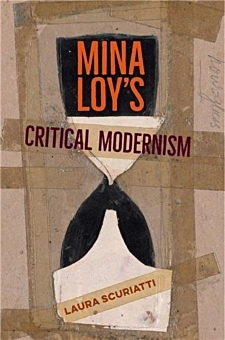 Laura Scuriatti shows how Loy’s “eccentric” writing and art celebrate ideas and aesthetics central to the modernist movement while simultaneously critiquing them, resulting in a continually self-reflexive and detached stance that Scuriatti terms “critical modernism.”
Laura Scuriatti shows how Loy’s “eccentric” writing and art celebrate ideas and aesthetics central to the modernist movement while simultaneously critiquing them, resulting in a continually self-reflexive and detached stance that Scuriatti terms “critical modernism.”
Drawing on neglected archival material, Scuriatti illuminates the often-overlooked influence of Loy’s time spent amid Italian avant-garde culture. In particular, she considers Loy’s assessment of the nature of genius and sexual identity as defined by philosopher Otto Weininger and in Lacerba, a magazine founded by Futurist leader Giovanni Papini. She also investigates Loy’s reflections on the artistic masterpiece in relation to the world of commodities; explores the dialogic nature of the self in Loy’s autobiographical projects; and shows how Loy used her “eccentric” stance as a political position, especially in her later career in the United States.
Offering new insights into Loy’s feminism and tracing the writer’s lifelong exploration of themes such as authorship, art, identity, genius, and cosmopolitanism, this volume prompts readers to rethink the place, value, and function of key modernist concepts through the critical spaces created by Loy’s texts.
Laura Scuriatti, professor of English and comparative literature at Bard College Berlin, is coeditor of The Exhibit in the Text: Museological Practices of Literature.
Mina Loy’s Critical Modernism
Laura Scuriatti
Hardcover
320 pages
Literature – European
ISBN 13: 9780813056302
$85.00
Available for pre-order.
This book will be available in July 2019
(Pub Date: 5/7/2019)
# New books
Mina Loy
Critical Modernism
• fleursdumal.nl magazine
More in: - Book News, - Bookstores, Archive K-L, Archive K-L, Archive S-T, Art & Literature News, Futurism, Loy, Mina
«Une semaine qu’elle tient. Une semaine qu’elle n’a pas cédé. Adèle a été sage. En quatre jours, elle a couru trente-deux kilomètres.
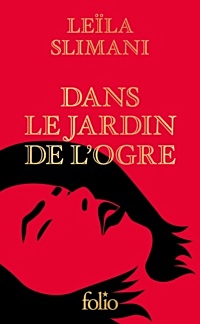 Elle est allée de Pigalle aux Champs-Élysées, du musée d’Orsay à Bercy. Elle a couru le matin sur les quais déserts.
Elle est allée de Pigalle aux Champs-Élysées, du musée d’Orsay à Bercy. Elle a couru le matin sur les quais déserts.
La nuit, sur le boulevard Rochechouart et la place de Clichy. Elle n’a pas bu d’alcool et elle s’est couchée tôt.
Mais cette nuit, elle en a rêvé et n’a pas pu se rendormir.
Un rêve moite, interminable, qui s’est introduit en elle comme un souffle d’air chaud.
Adèle ne peut plus penser qu’à ça. Elle se lève, boit un café très fort dans la maison endormie. Debout dans la cuisine, elle se balance d’un pied sur l’autre.
Elle fume une cigarette. Sous la douche, elle a envie de se griffer, de se déchirer le corps en deux. Elle cogne son front contre le mur. Elle veut qu’on la saisisse, qu’on lui brise le crâne contre la vitre.
Dès qu’elle ferme les yeux, elle entend les bruits, les soupirs, les hurlements, les coups. Un homme nu qui halète, une femme qui jouit. Elle voudrait n’être qu’un objet au milieu d’une horde, être dévorée, sucée, avalée tout entière.
Qu’on lui pince les seins, qu’on lui morde le ventre.
Elle veut être une poupée dans le jardin de l’ogre.»
Leïla Slimani
Dans le jardin de l’ogre
Nouvelle édition à tirage limité en 2018
Prix littéraire de la Mamounia 2015
Collection Folio, Gallimard
Parution : 01-11-2018
240 pages
sous couverture illustrée
108 x 178 mm
Roman
Littérature française
ISBN : 9782072821967
Gencode : 9782072821967
Code distributeur : G02382
Prix : 8,05 €
# New books
Leïla Slimani
Dans le jardin de l’ogre
Nouvelle édition
• fleursdumal.nl magazine
More in: - Book News, - Bookstores, Archive S-T, Art & Literature News, Leïla Slimani
Thank you for reading Fleurs du Mal - magazine for art & literature